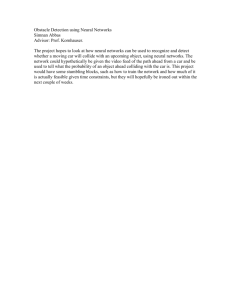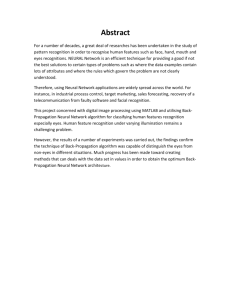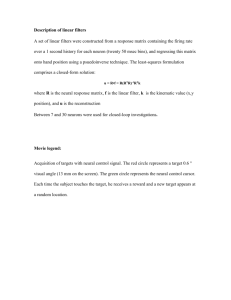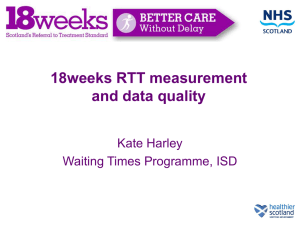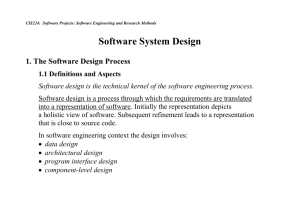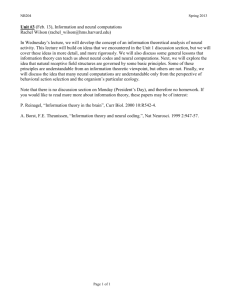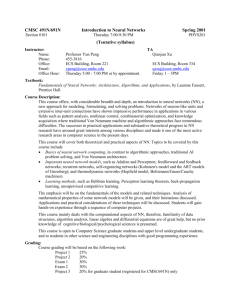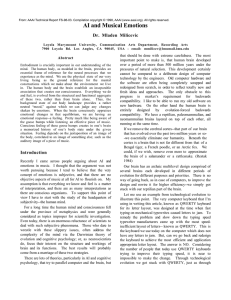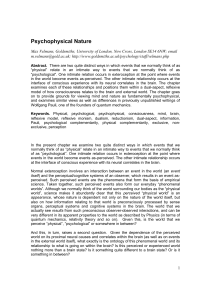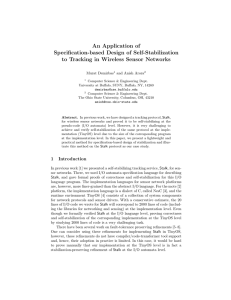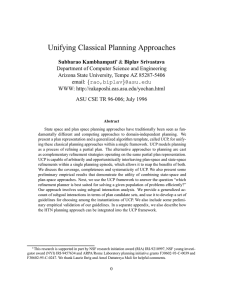Theoretic Approaches to Consciousness_BOURKE
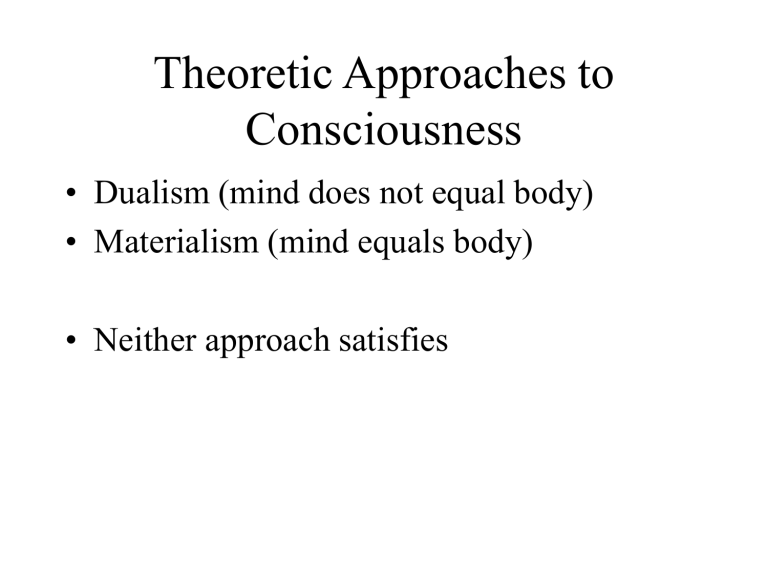
Theoretic Approaches to
Consciousness
• Dualism (mind does not equal body)
• Materialism (mind equals body)
• Neither approach satisfies
Refinements
• Higher order thought (HOT) theories
(Rosenthal)
• Brain has a neural state corresponding to being aware of a separate first order neural state, example: first order state is the neural correlate of looking at a red object, second order state is that associated with being aware of “red”
Refinements
• Functionalism (Searle)
• Pain example: Pain understood as the collection of the input of noxious stimuli; behaviors resulting,such as withdrawal, crying etc: to expressed desires for the pain to go away. Any machine that replicated these functions would be in pain. Exact neural state does not matter.
Refinements
• Global workspace theory (Baars)
• Analogy to theatre in the mind. A spot light reveals what is conscious and this feeds back to rest of unconscious mind.
Refinements
• Dynamic core (Edelman)
• Connections of neural states feeding back and forth between cortex and thalamus
Refinements
• Computational (Pinker)
• String Theory
• Panpsychism or variants
Refinements
• Quantum Theories (Hamerhoff)
• DISCUSSION (Joe Brophy)
_
Why do we need a theory about brains and mind?
• Jeff Hawkins
• http://www.ted.com/index.php/talks/jeff_ha wkins_on_how_brain_science_will_change
_computing.html
Further Reading
• Max Velmans
• Christof Koch
• Stuart Hameroff
• Paula Churchland
• Dan Dennett
• Paul Davies
• Stephen Priest
• Douglas Hofstadter
• Steven Johnson
• Howard Gardner
• Gerald Edelman
• Oliver Sacks
• Daniel Levitin
• Jonah Lehrer
• John Searle
• Rita Carver
Further Reading
• Antonio Damasio
• John Holland
• Michael Gazzaniga
• Francis Crick
• Bernard Baars
• V. Ramachandran
• Adam Zeman
• Stephen Pinker
• Nicholas Humphrey
• Joseph Ledoux
• Guilio Tononi
• David Chalmers
• Semir Zeki
• William Calvin
• Anthony Damasio
• Roger Penrose
Compendia
• Blackwell Companion to Consciousness ed
Max Velmans and Susan Schneider 2007
• Essential Sources in the Scientific Study of
Consciousness Bernard Baars, William
Banks, and James Newman eds 2003
Useful Web Sites
• Skeptic.com
• Sciencenews.org
• Mindhacks.com
• (BBC All in the Mind) http://www.abc.net.au/rn/allinthemind/
• http://neuronarrative.wordpress.com/
• http://www.neurosciencegateway.org/index.shtml
Useful Web Sites
• http://channeln.blogspot.com/
• UCTV.edu
• http://www.uctv.tv/
• http://www.edge.org/
• http://research.google.com/video.html
• http://www.ted.com/
• http://www.sfn.org/
Useful Web Sites
• http://www.mindscience.org/index.cfm
• http://www.nsi.edu/
• http://www.consciousness.arizona.edu/tucso n2008.htm
• http://neukominstitute.com/
• http://ocw.mit.edu/OcwWeb/web/home/hom e/index.htm
Useful Web Sites
• http://www.brl.ntt.co.jp/IllusionForum/basic s/visual/index-e.html
• http://cogprints.org/ (huge bibliography)
• http://www.sciam.com/section.cfm?id=mind matters
• http://consc.net/mindpapers (huge reference list)
Useful Web Sites
• http://scienceblogs.com/neurophilosophy/
• http://www.lawandneuroscienceproject.org/
• http://neuropolitics.org/
• http://www.neuroesthetics.org/
• http://plaisir.berkeley.edu/
• http://www.nature.com/neurosci/neuropod/i ndex-2008-05-19.html
Useful Web Sites
• http://www.dana.org/
• http://www.ucsd.tv/greymatters/
• http://www.pbs.org/saf/archive.htm
